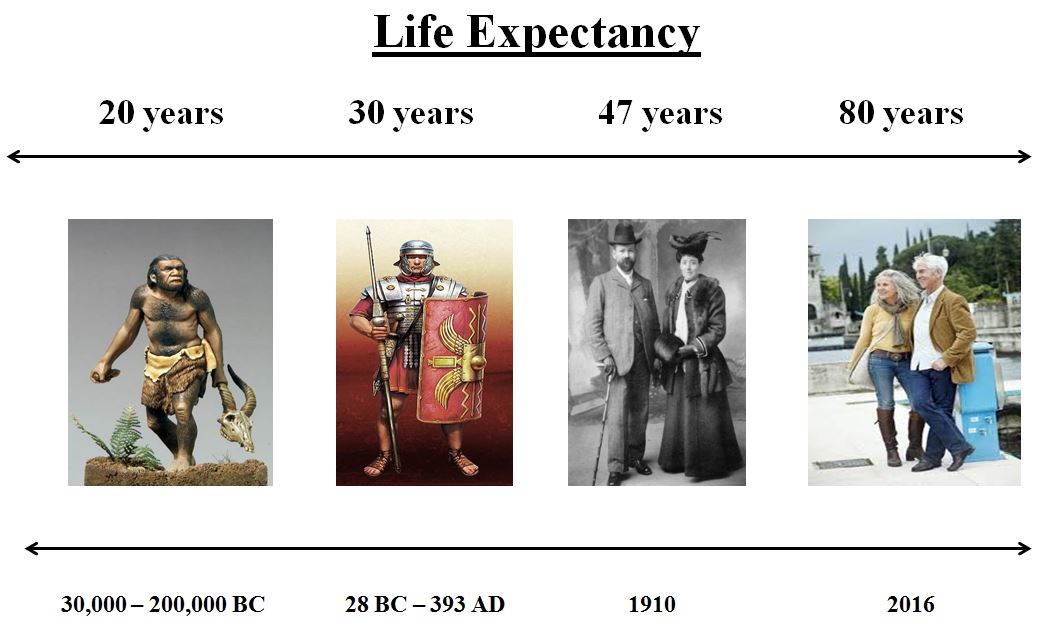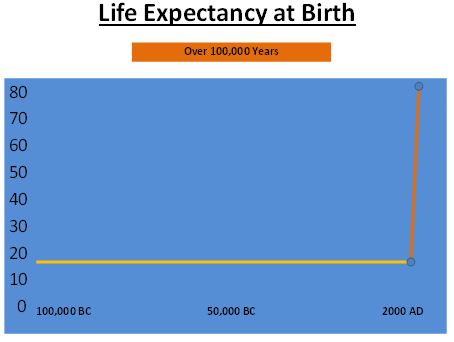
You’ve heard it a thousand times.
We’re living longer. Yay!
We extended our average lifespan more in 110 years than we did in the previous 100,000 years. That’s quite a hockey-stick performance.

Makes you wonder why we waited so long. What was so magic about the 20th century? I guess you could say that a few folks woke up and started picking low-hanging fruit that was killing us early, and let it accelerate from there.
Like:
- Washing hands before surgery. DUH!
- Better sanitation.
- Finding cures for most of the infectious diseases that dominated the early part of the century.
- Improving education – availability, methods, and content.
- Better food – quality and distribution.
- Cleaner water.
- Safer work environments and implements.
Medicine and technology teamed up and hockey-sticked it for us.
Then we hit a wall. It turns out that the progress stopped – and that longer doesn’t always mean better. The average lifespan in the U.S. has turned down each year since 2016. Read Full Article.

Some people think it’s hard to do all these things during lockdown. But I think it’s the perfect opportunity to experiment with trying out new things and changing your habits. We can contact all our friends and family by writing to them and zooming in on them. We have the time to read loads of books. There’s so many great things you can learn about on the internet – MOOCs for instance are courses from top universities and many of them are free, so it needn’t be expensive. Time for everyone to get going.
You make outstanding points, Rosemary. Thanks for chiming in with these solid suggestions. My wife and I doing some of those things and aren’t feeling as restricted as most but could be doing more, especially reaching out to friends. I have taken advantage of this time to add a couple of professional certifications (Resume writer certification and LinkedIn strategist certification) and have my eyes on a few others plus doing another career pivot to put more emphasis on helping post-50 folks make meaningful, purposeful lifestyle decisions going forward. Thanks for being a reader and for your comment.
Another great article Gary. People need to wake up to what is really happening and how they can better prepare themselves for what lies ahead.
Thanks Mike. I appreciate your comment as one who is “in the trenches” thinking and saying the same things. Looking forward to your next book. Let me know when it’s available.
I work with many clients over 75 and there are common traits for the ones that have a better life. You touched on most of them. The only addition is live with purpose. Every one of my clients 85+ live a life of purpose. It is fun watching people that age start a farm, business, or non-profit. At 60 it gives me hope.
Great point, Butch. I appreciate the perspective you’ve gained as you’ve made this huge life transition and chose to help people in a deep way. The sense of meaning (the “why”) and purpose (the “what’s next”) is sorely lacking in so many of our 60+ peer group as you’ve witnessed. But you “can’t push a rope” – people are going to do what they want. The best we can do is be the example and continue to encourage. Thanks for your insight.
Wonderful article, Gary. Almost everything we need to improve the quality of our lives for longer is already available to us and most of it is free. But changing habits is very tough for most people unless they are able to visualize their healthier, more energetic future self.
Thanks, Eric. Maybe because it is “free” and so obvious, we end up not trusting it as the truth. Your point about visualization is SO important. If you can’t/don’t envision it, there’s no incentive. My vision of something other than wheelchairs, walkers, nurses, needles, and oxygen bottles motivates me. I’ve witnessed too much of that.
Great insights! We knew it, but don’t it! Need to find some hard solution to break it and adopt the habits mentioned. You may throw some ways to do it without compromising.
You are right – we know but don’t do it. Trying to do all of them at once would be difficult. Pick one and grow into it by committing to adopting the habit for 60 days. By then, you’ve replaced the old “bad” habit